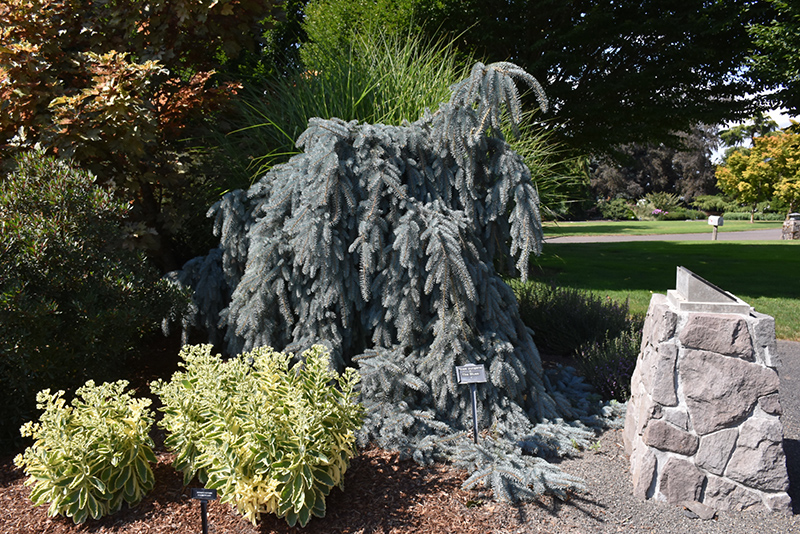The Blues Colorado Blue Spruce (tree form)
Picea pungens 'The Blues (tree form)'
Height: 10 feet
Spread: 6 feet
Sunlight:
![]()
Hardiness Zone: 3
Other Names: Blue Colorado Spruce;Colorado Blue Spruce
Description:
A slow-growing accent tree with gracefully pendulous branches and fine bright blue needles; can be trained to grow upright and may reach 6ft in 10 years; makes a stunning visual impact in the landscape
Ornamental Features
The Blues Colorado Blue Spruce (tree form) is primarily valued in the landscape or garden for its highly ornamental weeping form. It has attractive steel blue evergreen foliage which emerges silvery blue in spring. The needles are highly ornamental and remain steel blue throughout the winter. The rough gray bark adds an interesting dimension to the landscape.
Landscape Attributes
The Blues Colorado Blue Spruce (tree form) is a dense evergreen dwarf tree with a strong central leader and a rounded form and gracefully weeping branches. Its average texture blends into the landscape, but can be balanced by one or two finer or coarser trees or shrubs for an effective composition.
This is a relatively low maintenance dwarf tree. When pruning is necessary, it is recommended to only trim back the new growth of the current season, other than to remove any dieback. Deer don't particularly care for this plant and will usually leave it alone in favor of tastier treats. It has no significant negative characteristics.
The Blues Colorado Blue Spruce (tree form) is ideal for use as a garden accent or patio feature, and is recommended for the following landscape applications;
- Accent
- Vertical Accent
- Hedges/Screening
- General Garden Use
Planting & Growing
The Blues Colorado Blue Spruce (tree form) will grow to be about 10 feet tall at maturity, with a spread of 6 feet. It tends to be a little leggy, with a typical clearance of 1 foot from the ground, and is suitable for planting under power lines. It grows at a slow rate, and under ideal conditions can be expected to live for 80 years or more.
This dwarf tree should only be grown in full sunlight. It is very adaptable to both dry and moist growing conditions, but will not tolerate any standing water. It is considered to be drought-tolerant, and thus makes an ideal choice for xeriscaping or the moisture-conserving landscape. This plant does not require much in the way of fertilizing once established. It is not particular as to soil type or pH, and is able to handle environmental salt. It is highly tolerant of urban pollution and will even thrive in inner city environments. This is a selection of a native North American species.







